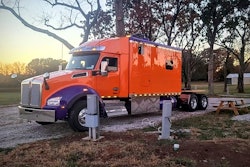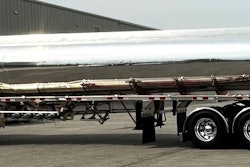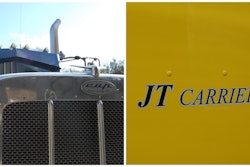Trucking news and briefs for Wednesday, May 24, 2023:
Another major city considers truck parking ban
The city of St. Paul, Minnesota, could potentially join its neighbor Minneapolis in banning truck parking within city limits.
When the St. Paul City Council meets Wednesday, May 24, it will discuss an ordinance that will change the city’s rules on truck parking, which already bans trucks from parking in residential areas. The new ordinance would ban truck parking on any city street.
According to the text of the ordinance, there have been “numerous complaints made by city of Saint Paul residents about the increased number of commercial vehicles and semi-trucks parking in the city generating public safety and nuisance concerns.” The ordinance notes it's “common for these vehicles to cluster together and park along entire city blocks and sometimes on both sides of the street.”
A presentation about the ordinance said that without it, the city “cannot efficiently, effectively, fairly, or equitably manage the truck parking complaints we are receiving.”
The ordinance would mirror the Minneapolis parking ban in prohibiting any vehicle over 26,000 pounds from parking on any city street unless engaged in loading/unloading or providing a service. It also raises the weight for vehicles restricted from parking in residential districts from 6,000 pounds to 10,000 pounds.

[Related: How owner-operators can fight back in the war on truck parking]
Additionally, instead of the current standard $40 parking citation fee, the new ordinance would create an elevated citation fee of $150 beginning in January 2024, then $250 starting in July 2024.
The Minnesota Trucking Association said it strongly opposes the ordinance.
“The proposed ordinance will reduce overall efficiency and cut into precious available driving hours for truck drivers forced to park outside of St. Paul,” said MTA President John Hausladen. “It is a simple fact that to meet narrow pickup and delivery windows, trucks need to park close to their St. Paul customers. When Minneapolis passed a similar ordinance, some drivers were forced to park in remote fee-based lots as far away as St. Cloud.”
Hausladen added that many of the trucks parked overnight in the city are owned by independent contractors who have “no viable overnight parking alternative,” adding that the “ban could effectively force these residents to cease operations and lose their livelihood.”
[Related: Minneapolis follows through with truck parking ban]
Progressive Insurance offering roadside assistance
Progressive Insurance is now offering Heavy Truck Roadside Assistance (HT RSA) as an optional coverage to its commercial auto customers.
HT RSA helps cover the cost of towing and labor at the site of disablement, the company noted. In collaboration with TTN Fleet Solutions, which operates an extensive network of heavy-duty service providers, Progressive can now offer roadside assistance coverage in most policy states to commercial auto customers with heavy vehicles, including tractor-trailers, dump trucks, straight trucks and more.
Covered customers simply have to call Progressive's roadside number to connect with TTN Fleet Solutions, which will dispatch a qualified service provider to the site of disablement. This process saves time in finding a qualified provider and removes the need to file for reimbursement after the fact. Coverage can be used throughout the United States and in 10 Canadian provinces, regardless of the policy state, and is available to local, regional and long-haul truckers.
The HT RSA coverage includes the following:
- Covers up to $500 in labor at the site of disablement and up to $5,000 in towing to the nearest qualified repair facility for the insured vehicle and attached trailer ($250 deductible applies at time of service)
- Covers insured vehicle and the attached trailer
- Covers mechanical or electrical breakdown, battery failure, flat tire, lock-out, insufficient fuel/fluid, or entrapment in snow, mud, water, or sand within 100 feet of a road
- Covers up to three roadside incidents per insured vehicle per six-month period
[Related: Why you shouldn't deceive your insurer]
Convoy joins Volvo autonomous program
Digital freight network/broker Convoy is collaborating with Volvo Autonomous Solutions (V.A.S.) to secure autonomous freight capacity for customers once it becomes available on select routes in Texas.
Through the partnership, Convoy and V.A.S. aim to drive better efficiency into the supply chain while allowing shippers in Convoy’s network to take advantage of autonomous transport offerings and be a part of the industry shift.
The reservation program will use the hub-to-hub model. Convoy’s carrier network of small fleets and owner-operators will gain access to lucrative opportunities to deliver customer loads to a pick-up hub in Texas, then V.A.S.’ autonomous fleet will execute the long-haul to the next hub. A carrier in Convoy’s network would then deliver the load to its final destination.
“We are excited to add Convoy to our growing list of early reservation customers and work together to bring all the benefits of autonomous trucking technology to shippers on the Convoy network,” said Nils Jaeger, President of Volvo Autonomous Solutions. “This collaboration underlines the growing interest in autonomous technology as the industry looks for ways to increase freight capacity, improve efficiency and safety.”
Under the hub-to-hub model, autonomous trucks will operate on highways, providing service between transfer hubs throughout the day and night. Autonomous trucks will contribute to the growth of freight volume, increasing demand for truck drivers to deliver goods from the transfer hubs to their final destinations, the companies believed, with potential to enhance the work-life balance of truck drivers by enabling local drivers to transition into short-haul jobs with more home time.
[Related: Connecting the dots: FMCSA's electronic-ID questions, Level 8 e-inspections, autonomous trucks]








